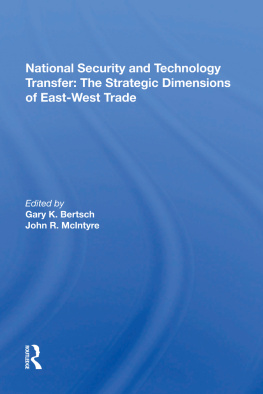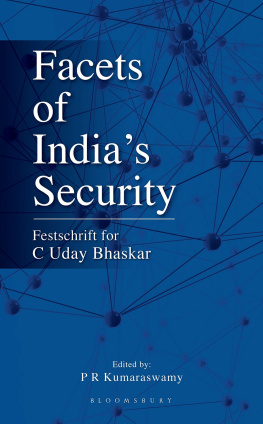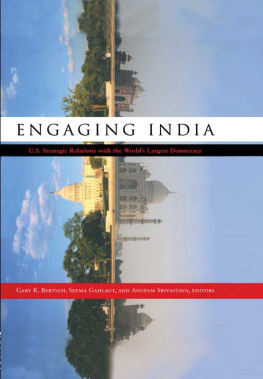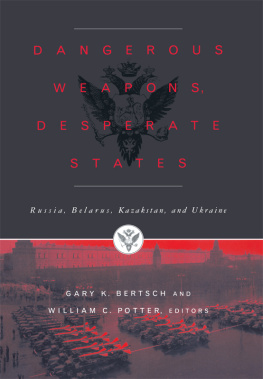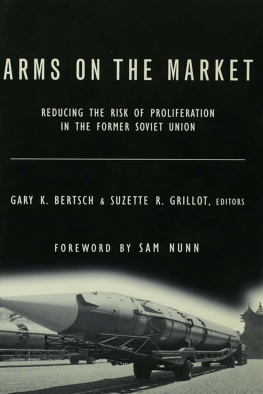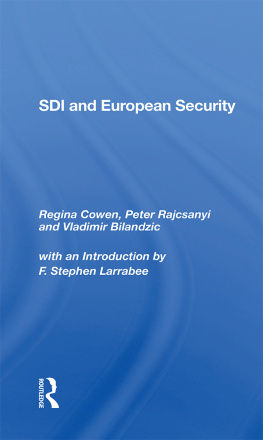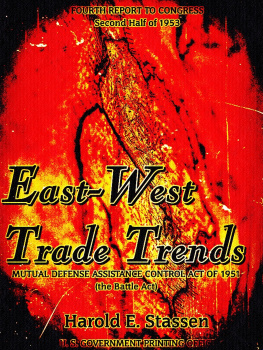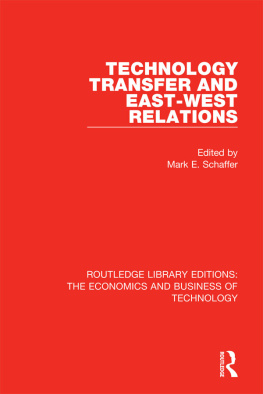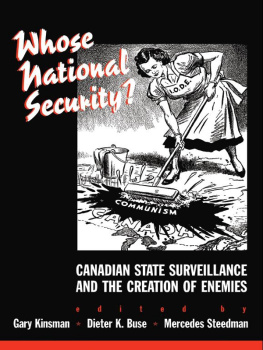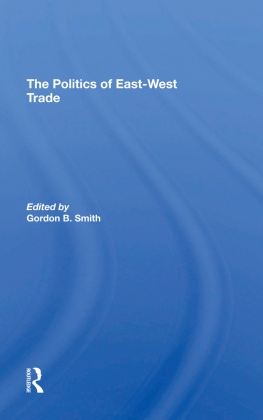National Security and Technology Transfer
Also of Interest
* The Defense of the West: Strategic and European Security Issues Reappraised, edited by Robert Kennedy and John M. Weinstein
* Managing U.S.-Soviet Rivalry: Problems of Crisis Prevention , Alexander L. George and Associates
* Arms and Politics , 1958-1978, Robin Ranger
Thinking About National Security: Defense and Foreign Policy in a Dangerous World, Harold Brown
National Security Crisis Forecasting and Management, edited by Gerald W. Hopple, Stephen J. Andriole, and Amos Freedy
U.S. Defense Planning: A Critique, John Collins
Oil Strategy and Politics, 1941-1981, Walter J. Levy, edited by Melvin A. Conant
Technology Transfer to Cities: Processes of Choice at the Local Level, W. Henry Lambright, Paul J. Flynn, Albert H. Teich, and Alfreda B. Lakins
Transferring Food Production Technology to Developing Nations: Economic and Social Dimensions, edited by Joseph J. Molnar and Howard A. Clonts
World Climate Change: The Role of International Law and Institutions, edited by Ved P. Nanda, with a Foreword by Walter Orr Roberts
Arms Control in Transition: Proceedings of the Livermore Arms Control Conference, edited by Warren Heckrotte and George C. Smith
* Available in hardcover and paperback.
Westview Special Studies in National Security and Defense Policy
National Security and Technology Transfer: The Strategic Dimensions of East-West Trade
edited by Gary K. Bertsch and John R. McIntyre
The deterioration of dtente in the wake of the ongoing Soviet arms build-up has sharply focused the East-West trade debate on the question of advanced technology transfer from the United States and its allies to the Soviet bloc. The transfer and acquisition of high technology have become central ingredients in super-power relations and are key elements of any national security policy. President Reagan, among others, has questioned the wisdom of the policies of the 1960s and early 1970s, when trade with the Soviet Union and Eastern Europe expanded rapidly. At recent industrial nation summits, conferees of Western countries agreed to high-level review of their East-West technology trade policies. But in light of the apparent West European commitment to continue and expand trade with the East, as exemplified by the Siberian gas pipeline project, and the growing U.S. opposition to such technology transfer, divisions between U.S. and Western trade policies toward the East are likely to become increasingly acute in the years ahead.
Professors Bertsch and McIntyre have selected comprehensive and representative articles to examine the question of technology transfer from a variety of perspectives--political, economic, and military emphasizing both the U.S. and the Western allies' points of view and offering insights into the complex issues raised by the strategic dimensions of East-West trade.
Dr. Bertsch is professor of political science at the University of Georgia. Dr. McIntyre is assistant professor in the Technology and Science Policy Program at the Georgia Institute of Technology and a fellow of the Dean Rusk Center at the University of Georgia Law School.
First published 1983 by Westview Press
Published 2018 by Routledge
52 Vanderbilt Avenue, New York, NY 10017
2 Park Square, Milton Park, Abingdon, Oxon OX14 4RN
Routledge is an imprint of the Taylor & Francis Group, an informa business
Copyright 1983 by Taylor & Francis
All rights reserved. No part of this book may be reprinted or reproduced or utilised in any form or by any electronic, mechanical, or other means, now known or hereafter invented, including photocopying and recording, or in any information storage or retrieval system, without permission in writing from the publishers.
Notice:
Product or corporate names may be trademarks or registered trademarks, and are used only for identification and explanation without intent to infringe.
Library of Congress Catalog Card Number 83-50026
ISBN 13: 978-0-367-01487-2 (hbk)
The security issues surrounding East-West trade and technology transfer have always generated much controversy. They are by no means novel. They have, however, become far more contentious and troublesome of late with the further deterioration of dtente and the eroding consensus in the Atlantic Alliance on a common trade policy with the East. Central to this topic are the questions of what items should be considered strategic for purposes of trade with an adversary, how best to protect technology in which the U.S. or the West has a lead, and how to devise a policy that will take into account both the legitimate national security risks and economic benefits of trade for the U.S. and for the individual members of the Atlantic Alliance.
The recent history of East-West relations is broadly illustrative of the centrality of these issues and of their perennial character. Recent political developments (e.g., the 1979 Soviet invasion of Afghanistan, the December 1981 imposition of martial law in Poland, the crushing of Soviet dissidents, etc.) and military developments (e.g., the massive Soviet arms buildup and the situation of parity in the field of strategic nuclear weapon systems) have prompted the United States to reconsider its overall East-West policy and, in particular, its technology transfer and trade policy. Many consider that the U.S. is at a crossroads in the development of a new policy stance on strategic trade with the Soviet bloc and that the current situation presents an ideal opportunity to devise a policy that will truly protect national security and technology lead times while insuring that trade is beneficial to both parties.
In the past few years a rich and unsystematized literature has developed on these topics. The purpose of this book is to foster a better understanding of the key policy issues surrounding strategic trade, technology transfer and national security in the context of East-West relations. These issues will be with us throughout the 1980s and doubtless as we move into the next century. By drawing on the best available material to present the most up-to-date thinking on these problems the editors wish to present in a systematic fashion the underlying problems of strategic technology trade both from a variety of disciplinary perspectives and analytical foci (political, economic/commercial, military), bearing in mind all the while the national and multilateral dimensions of technology transfer policy. Accordingly, each of the seven chapters has a specific theme and focus which is reviewed and introduced by the editors and treated at length in the selections.
The first chapter introduces the reader to the fundamental issues of East-West technology transfer and provides an analytical frame of reference not only in terms of definitions but also for the central concepts developed subsequently by various authors from diverse perspectives. The economic implications (i.e., the costs and benefits) associated with technology trade with the East is the subject of the second chapter. integrates the various perspectives presented earlier and offers a sense of the range of policy options available to the United States and its allies.


